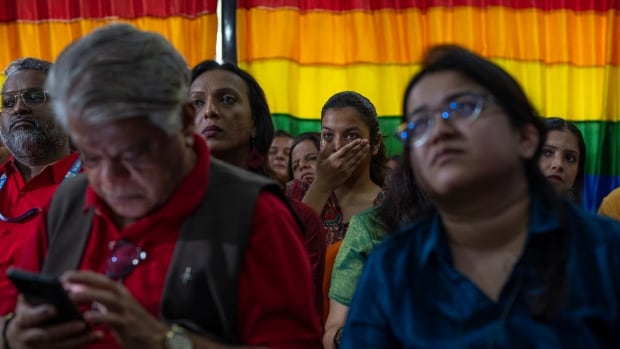India’s Supreme Court on Tuesday refused to legalize same-sex marriage, leaving the decision to Parliament, with Prime Minister Narendra Modi’s government saying Parliament was the appropriate forum to rule on the contentious issue. agreed.
Five years after the court struck down a colonial-era ban on gay sex, the unanimous ruling by five judges was a major disappointment for the LGBTQ community in the world’s most populous country.
There was no immediate reaction from the government to the court’s ruling, but Prime Minister Modi’s nationalist Bharatiya Janata Party (BJP) government said same-sex marriage was “not comparable to the concept of the Indian family unit.” It had opposed petitioning the court on the issue. husband, wife and children. ”
The court’s decision came in response to more than a dozen petitions filed since last year. A bench headed by Chief Justice DY Chandrachud heard arguments in April and May before delivering its verdict on Tuesday.
featured videosSaatvich moved to Canada with his partner because of the slow progress on LGBTQ rights in India, but he hasn’t given up on the fight to legalize same-sex marriage in his home country. He explains why not recognizing marriage equality could be costly for India.
Chandrachud said there was “some agreement and some disagreement about how far we should go” on same-sex marriage, with four of the five justices ruling separately, reflecting the complexity of the case. He added that he had written a judgment.
“This court cannot make laws; it can only interpret and enforce them,” Chandrachud said, adding that the government’s view that being gay is “urban or elite” He also denied the claim.
The court referred the decision to a committee proposed by the government to address the “human concerns” of same-sex couples.
It said the committee should include professionals with knowledge and experience in addressing the social, psychological and emotional needs of people in the gay community.
The Commission should also consider giving same-sex couples access to services and facilities that are currently prohibited, such as joint banking and pension accounts.
Petitioners crying outside court
Chandrachud and another judge mentioned recognizing same-sex unions and civil unions, but the other three justices disagreed.
Ravindra Bhat, one of the other three judges, said: “Marriage is a social institution. Marital relationships are not conferred by the state.” “The idea of marriage is not a fundamental right.”
After the verdict, members of the LGBTQ community could be seen leaving the courtroom in tears, some comforting each other.
“I didn’t expect a very good verdict, but I feel much worse than I expected,” said Uday Raj Anand, who filed the case with his same-sex partner.

“What I was thinking was that at least the courts would make their position clear and say that they are not in a position to make or change the law, but they are certainly in a position to direct the government to do it. ” he said.
“So it’s a little shocking that we didn’t get that much more.”
Activists say that while a 2018 ruling overturning a ban on gay sex affirmed their constitutional rights, legal backing for unionization, a fundamental right enjoyed by heterosexual couples, remains. They argue that the lack is unjust.

